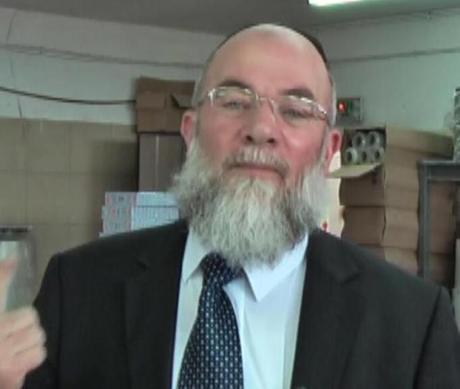Rabbi Lau has now withdrawn his statement and is saying that Zoglowek will not lose its hechsher.
What changed?
 On Thursday Rabbi Lau met with the directors of Zoglowek, along with the various relevant kashrut directors to discuss the matter. Rabbi Lau said that besides for kashrut issues, the Rabbanut demands from factories and slaughterhouses all over the country extra care and concern for tzaar baalei chayyim issues as part of the strict kashrut procedures.
On Thursday Rabbi Lau met with the directors of Zoglowek, along with the various relevant kashrut directors to discuss the matter. Rabbi Lau said that besides for kashrut issues, the Rabbanut demands from factories and slaughterhouses all over the country extra care and concern for tzaar baalei chayyim issues as part of the strict kashrut procedures.Mr. Ami Zoglowek responded that his parents had instructed him that the factory will always be kosher and the shechita will always be kosher, and ever since the day the factory was established, there has never been even a single complaint against them regarding kashrut, shechita and halacha.
They reviewed all the kashrut issues, the reports from the factory, the entire process of shechita and what happens when the chickens arrive there.
The director of the factory said they have followed every directive issued by the Rabbanut, and despite the factory meeting the strictest standards both from the veterinarian services and from the halachic standards, they have decided to go the extra mile and stop all activity in the factory.
The rav of Nahariya said that the factory has always been very careful about following all the rules of the Rabbanut.
Rabbi Lau closed the meeting saying that he is relying on the kashrut team headed by the rav of Nahariya, and stressed the need to deal with the issues of tzaar baalei chayyim not just at the time of shechita but throughout all the stages of the chicken on the way to the slaughter. The issue would be raised in the council of the Rabbanut and it would be demanded of all such factories around the country.
 (source: Srugim and NRG)
(source: Srugim and NRG)Somehow though, the questions don't seem to have been answered. If the supervision was tight, as both sides seem to be saying it was, and if all the rules were in place and being followed, as both sides seem to be agreeing they were, then how did this happen?
It sounds like the Rabbanut does not supervise the transport, along with the loading and unloading, of the chickens. Were they only supervising the actual shechita but nothing else? Did they need to - not in retrospect, but from an actual halachic kashrut perspective?
Bechadrei asked Rav Yosef Zaritzki, a known kashrut expert who has worked for many kashrut organizations including both the Rabbanut and the Badatz Eida Hachareidit among others, to explain the differences between the shechita of the Badatz organizations and the shechita of the Rabbanut.
Now, just to mention a disclaimer, they obviously have an agenda, to show why the badatz is better than the rabbanut. I have no idea what is accurate, what is not, and I have no idea what other issues are relevant but not being mentioned. I am bringing his words here because they are enlightening and interesting.
Case in point, just two days ago Rav Zaritzki himself said, in light of the expose and Chief Rabbi Lau's statement about considering rescinding the kashut of Zoglowek, that there were no kashrut problems exposed in the Kolbotek expose and it is possible that Rabbi Lau does not know much about kashrut - it is a problem that many rabbonim around the country are selected by politics and think they already know everything. Zaritzki said that this inhumane treatment of the fowl has nothing to do with the shechita and halacha, but the Ministry of Education should train people to act in a more humane manner.
Rav Zaritzki does say that the treatment dished out to the fowl as seen in the video is prohibited as a cruelty issue, but it has nothing to do with kashrut. The video does not show if the birdsare kosher or not, how they were affected by the cruel treatment... the video showed a lot of abuse relevant to humane treatment of the birds, but the shochtim eventually get the birds in their hands to slaughter, and at that point they can tell if there is a problem with the bird or not. And if the shochet did not notice any problem with the bird, it then goes through the plucking process where mashgichim check each bird and they would spot any bird that was treif due to having been abused. It is the job of the mashgiach to look for such signs and to catch them. All the issues that happened before shechita are a big problem and it must be resolved [but it has nothing to do with the kashrut of the shechita].
Rav Zartitzki actually pointed a finger inward - he said that he does not understand everyone is screaming about the abusive treatment of the chicken and turkeys in this factory, while every year right before Yom Kippur the abusive treatment of the birds is right by us in the haredi community: the birds are caged up for 24 hours with no food and water, and nobody opens their mouths and cares. Many people have stopped doing kapparot with chickens because of this abusive treatment.
(source: Kikar)
It is a good point, but inaccurate:
1. he says nobody screams and nobody cares, but then he says many have stopped using chickens for kapparot because of it. so people do care and are upset about it.
2. Many people, even in the haredi comunity, do scream about it, increasingly so in recent years - but often they are dismissed by both the leaders of the haredi community and many "in the street" as being anti-haredi or anti-tradition.
So, back to the Bechadrei article... just note that Rav Zaritzki himself said that the expose showed no actual kashrut problems and the Rabbanut's supervision of the shechita was not compromised by the abusive treatment dished out prior to the shechita...

Rav Yosef Zaritzki
Rav Zaritzki said that the issue of the transport is the same in every factory around the country, except for factories under the supervision of mehadrin kashrut organizations. Under mehadrin supervision, every part of the process is performed slower and more delicately, and with full supervision including of the loading of the fowl, and that type of abusive behavior could never happen.
The transport of the chickens is supervised under the mehadrin hechshers, but under the Rabbanut it is not. They do the transport in the evening, because the chickens cannot see then and they are tired - so they are more docile and more easily handled. Only Arabs do this work - no Jews at all. And it is done in a cruel way. The mehadrin hechshers supervise this part of the process as well to ensure that the chicken are caged in a delicate manner.
Then there is the shechita - The shochet receives each chicken and looks at it to see if it is ok or if it has problems. Rav Zartizki says the shochtim are experts - they handle thousands of the birds each day, and even if they are doing it fast, they have the expertise to spot the problems. And, even if the shochet might miss a problem on a chicken, after the plucking any problem is easily spotted.
Rav Zaritzki says that under the Badatz hechshers, between 20 and 25 chickens per minute are slaughtered, while under the Rabbanut hechsher there are 7 shochtim on each side, 14 altogether, with each one shechting 15 chickens per minute.
(I am not sure what the problem is - it sounds like each shochet under the Rabbanut is shechting less than each shochet under a badatz, but overall the Rabbanut is shchting more. If that is accurate, the Rabbanut should be considered better. Unless he is saying the problem is with the mashgiach - that he cannot possibly supervise that many shechitas, and they do not have enough mashgichim - but he is not quoted as saying that).
Rav Zaritzki also denies having said what he said in the interview to Kikar Shabbat (quoted above). He even says no such interview took place. So, now we have to figure out who is making up the news, and who Rav Zaritzki really spoke to!
After all is said and done, if the veterinary services are not going to regulate and supervise the transport of the fowl to slaughter, perhaps the Rabbanut should consider adding ti as part of their supervision. I don't see how they can allow this type of behavior to continue.
And, after all is said and done, time and again so much of an issue is made in the frum world regarding the abuse of chickens and animals, which even Rav Zaritzki admits does not affect the kashrut, yet so little of an issue is made about the abuse of children... And I will leave it at that.
-------------------------------------------------------------
Donate to the Schneider Hospital so I can run the Schneider benefit marathon..

------------------------------------------------------ Reach thousands of readers with your ad by advertising on Life in Israel ------------------------------------------------------
